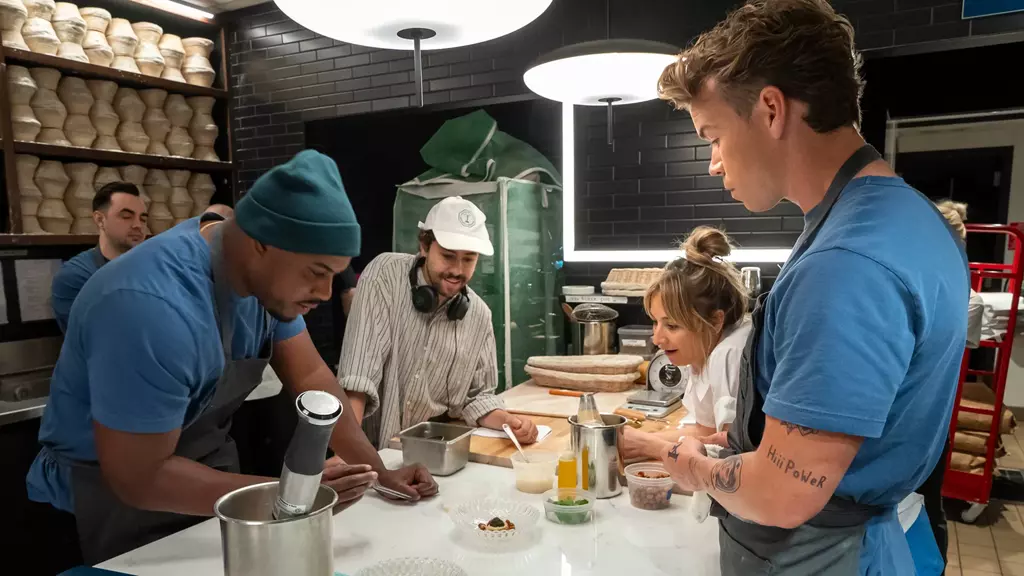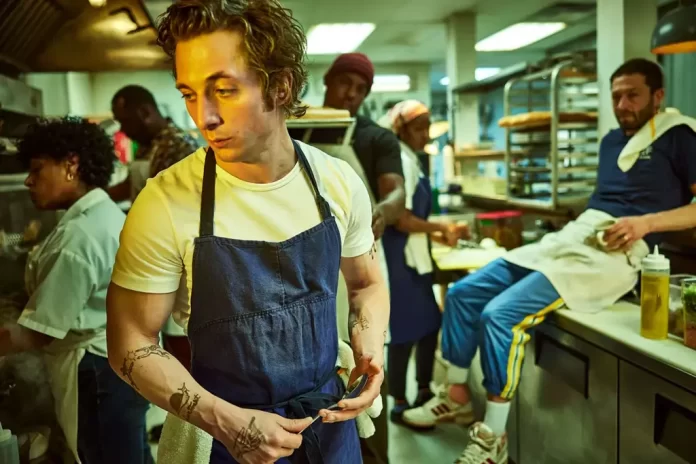Professional chef and author Anthony Bourdain described an encounter with a fellow chef in his Les Halles Cookbook: “I suggested once to a maniacal barbecue professional that cooking well was not a profession, it was a calling. He laughed and went further: ‘It’s an illness.’ I knew just what he meant.” This particular sentiment is one The Bear depicts so well. The series is able to translate realistic experiences, so even a viewer who’s never stepped foot in a dining establishment has no choice but to understand what it means to work in one.
The Bear is about food, definitely, but it’s about people, too.
The show centres around main character Carmen “Carmy” Berzatto (Jeremy Allen White), and his journey of fixing up his deceased brother’s sandwich shop to turn it into a fine dining restaurant — this is not a spoiler, I promise! It’s not just White’s acting prowess on display, but the whole cast is full of talented individuals dedicated to adding their brushstrokes to the masterpiece that is The Bear.
Three seasons in, there are pillars that the series’ creator Christopher Storer is adamant about maintaining: the setting of Chicago, the narrative haunted by a character we hardly know, and food.

The series is entrenched in the culinary world, throwing out terms like James Beard Award, Michelin Star ratings, and plenty more. The Bear is daunting with its culinary jargon, but it manages to relate the viewer, and the characters, to a world outside of it by depicting something raw and real. It portrays the ugliness of what it means to make something with your hands only for people to rip it and – by extension – you, apart.
The Bear starts in the middle of the narrative. While non-linear storytelling isn’t conventional in Western media, it works in the series’ favour as it leaves viewers with questions and allows for its writers to provide us with more answers.
Season one is the amuse-bouche, introducing the audience to the plot and characters. Season two is a dish deconstructed, providing a backstage look into the culinary world. Season three isn’t exactly the main course, but more like the stage between appetizers and the entrée, where you’re not starving, yet are still hungry. The newest season might be the most divisive in terms of public opinion, but in my humble opinion it is still very, very good.
Despite dichotomous reviews, The Bear has cemented itself in contemporary popular culture. The acclaimed series has won several awards, including multiple Primetime Emmy Awards, even though it was released just two years ago.
No matter what you may assume about The Bear, it’s nothing like you imagine. All preconceived notions are shattered once you press play. Each episode remains loyal to the series’ overarching themes, but the show doesn’t shy away from varied presentations: certain episodes are dedicated to the art of cooking, while others showcase particular characters and their stories. The series is excellent as a whole, yet the episode “Forks” is outstanding. It makes its mark by being the best episode of the series, and I would not dare to disagree.
The Bear is a drama and a comedy. Some deem the latter genre to be inapt, but I would argue that the show is simultaneously dramatic and hilarious. It includes witty writing, sharp cuts, diverse characters, rich storytelling, and a soundtrack that serves. The Bear doesn’t limit itself to any television conventions. It takes risks, providing a new and profound perspective on what is commonplace, and calls for us to push open the door dividing the dining room and kitchen in order to see the culinary world as it is.
If, by the end of the series, you don’t find yourself uttering “Yes, Chef,” nor do you tear up over a stack of napkins, I would highly advise that you watch it again.
The Bear is about more than cooking: it’s about the art of creation, the glaring differences between stasis and change, the persistence of love in times of hardship, the destructive nature of unrelenting ambition, and so much more. If you haven’t seen The Bear yet, I’m not requesting you do, I’m begging, for The Bear isn’t something you watch, it’s something you experience.


